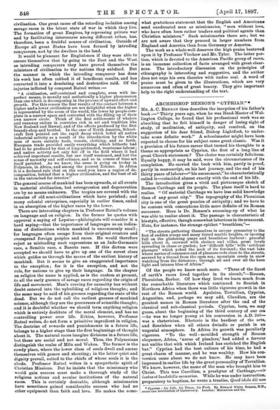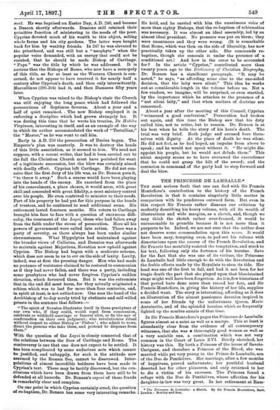ARCHBISHOP BENSON'S " CYPRIAN."* Mn. A. C. BENSON thus describes
the inception of his father's book :—" Thirty years ago, when he was Head-Master of Wel-
lington College, he found that his professional work was so absorbing that be felt himself in danger of losing sight of study, of meditation, of antiquity, and resolved, on the suggestion of his dear friend, Bishop Lightfoot, to under- take some definite work." A schoolmaster might have been expected to choose for his subject some great classic. Was it a prevision of his future career that turned his thoughts to a
theme so appropriate as Cyprian, the first of a long line of great Church statesmen ? The choice was certainly felicitous.
Equally happy, it may be said, were the circumstances of its completion. He carried the book with him, partly in proof, partly in manuscript, on his last journey, and the end of his thirty years of labour—" his amusement," he characteristically called it—coincided almost exactly with the end of his life.
The introduction gives a vivid and picturesque sketch of Roman Carthage and its people. The place itself is hard to realise. " Of material Carthage we have less solid knowledge than of any great city." The topography of the Phcenician city is one of the great puzzles of antiquity; and we have to be content with conceptions little more definite of its Roman successor. Here is Dr. Benson's summing-up of what he was able to realise about it. The passage is characteristic of his style, effective, though somewhat laborious in its ornament. Note, for instance, the strange epithet " breathless,"— " The streets gathering themselves in unique symmetry to the feet of sudden steeps and many tinted marble heights, or opening full on the glistening quays and breathless harbour : graceful hills about it, crowned with shrines and villas, great levels spreading in chase or garden; low difficult hills' with artificial passages' which yoked the neck of its foreland ; the vast lake where navies of commerce and of pleasure rode close to the streets, severed by a thread from the open sea; mountain crests in snow watching from the distances ; through all and over all the keen light and intense blue of Africa."
Of the people we know much more. " Three of the finest of earth's races lived together in its circuit,"—Roman, Phcenician, Berber. Of how they lived we learn much from the remarkable literature which continued to flourish in Northern Africa when there was little vigorous growth in the rest of the Roman world. Apuleius, Tertullian, Cyprian, Augustine, and, perhaps we may add, Claudian, are the greatest names in Roman literature after the end of the classical and sub-classical periods. Cyprian, born, we may
guess, about the beginning of the third century of our era —he was no longer young at his conversion in A.D. 246— was a rhetorician. Rhetoric is the hardiest of the arts, and flourishes when all others dwindle or perish in an ungenial atmosphere. In Africa its growth was peculiarly vigorous. " To the well - moulded strength of Roman eloquence, Africa, nurse of pleaders,' had added a fervour not unlike that with which Ireland has enriched the English bar." Cyprian had the best culture of his time, he had a great charm of manner, and he was wealthy, How his con-
version came about we do not know. He may have been impressed in earlier life by the great personality of Tertullian. We know, however, the name of the man who brought him to Christ. This was Caecilian, a presbyter of Carthage,—vir luster; et laudabilis memories. While he was under instruction, preparatory to baptism, he wrote a treatise, Quod idola dii non
• amnion : his Life, his Times, his Work. By Edward White Benson. D.D.s, sometime Archbishop of Canterbury. London: Macmillan and Co.
swat. He was baptised on Easter Day, A.D. 246, and became a Deacon shortly afterwards. Deacons still retained their primitive function of ministering to the needs of the poor. Cyprian devoted much of his wealth to this object, selling whole farms and his city gardens. The latter were bought back for him by wealthy friends. In 247 he was elevated to the priesthood, and was still but a " neophyte " when the popular voice demanded, with an energy that could not be resisted, that he should be made Bishop of Carthage. " Papa " was the title by which he was addressed. It is curious that the Bishops of Rome, who now have a monopoly of this title, as far at least as the Western Church is con- cerned, do not appear to have received it for nearly half a century after Cyprian's death, and then only intermittently.
Marcellinus (296.304) had it, and then Damasus fifty years later.
When Cyprian was raised to the Bishop's chair the Church was still enjoying the long peace which had followed the persecutions of Septimus Severna. About a year and a half of quiet remained. . The new Bishop employed it in enforcing a discipline which had grown strangely lax. It was during this time that he wrote his treatise, De Habitu Virginum, interesting in itself, and as an example of the way in which its author accommodated the work of "Tertullian," the "Master," as he was wont to call him.
Early in A.D. 250 the persecution of Decins began. The Emperor's plan was masterly. It was to destroy the heads of this little association, as it seemed to him. We need not suppose, with a recent writer, that had it been carried out to the fall the Christian Church must have perished for want of a legitimate succession, but the blow was certainly aimed with deadly effect. Cyprian left Carthage. He did not con- ceive that the first duty of his life was, as Dr. Benson puts it, " to throw it away." Such a course would have been playing into the hands of the enemy. He exercised from the place of his concealment, a place chosen, it would seem, with great skill and concealed with great fidelity, a most salutary control over his people. He even contrived to minister to their needs.
Part of his property he had put for this purpose in the hands of trustees, and he continued to send additional sums. His retirement lasted fourteen months. His return to Carthage brought him face to face with a question of enormous diffi- culty, the treatment of the Lapsi, those who had fallen away from the faith under the stress of persecution. Here all his powers of government were called into action. There was a party of severity, as there always has been under similar circumstances. What Hippolytus had maintained against the broader views of Callistus, and Donates was afterwards to maintain against Majorinus, Novatian now upheld against Cyprian. The Bishop had begun with a moderate scheme, which does not seem to us to err on the side of laxity. Laxity, indeed, was at first the pressing danger. Men who had made no pretence of resistance claimed to be restored to communion as if they had never fallen, and there was a party, including some presbyters who had never forgiven Cyprian's sudden elevation, which favoured them. But it was the extremists that in the end did most harm, for they actually originated a schism which was to last for more than four centuries, and, in spirit at least, is not extinct now. One sees the hand of the Archbishop of to-day sorely tried by obstinate and self-willed priests in the sentence that follows :—
" The spirit of Novatus illustrates itself in those presbyters of our own who, if they could, would repel from communion, celebrate or withhold marriage or funeral rites, or fix the age of confirmation on their own judgment; who revolutionise ritual without respect to either Bishop or • Plebes' ; who admit to vows, direct the persons who take them, and pretend to dispense from them."
With the question of the Lapsi is closely connected that of the relations between the Sees of Carthage and Rome. The controversy is one that one does not expect to be settled. It has been complicated by some audacious acts which cannot be justified, and unhappily, for such is the attitude now assumed by the Roman See, cannot be disavowed. Inter- polations of almost incredible boldness have been made in Cyprian's text. These may be tacitly disavowed, but the con- clusions which have been drawn from them have still to be
defended at all hazards. Dr. Benson's exposé of these frauds is remarkably clear and complete.
On one point in which Cyprian certainly erred, the question of re-baptism, Dr. Benson has some very interesting remarks.
He held, and he carried with him the unanimous voice of more than eighty Bishops, that the re-baptism of schismatics was necessary. It was almost an ideal assembly, led by an almost ideal president. No pressure was put on them; they were unanimous and they were wrong. (It is remarkable that Rome, which was then on the side of liberality, has now practically taken up the other side. She commands re- baptism, though she conceals it under the pretence of a conditional act.) And how is the error to be accounted for ? In the article " Cyprian," contributed more than twenty years ago to the Dictionary of Christian Biography, Dr. Benson has a significant paragraph. "It may be noted," he says, " as affording some clue to the one-sided decision, that the laity were silent." This idea he works out at considerable length in the volume before us. Not a few readers, we imagine, will be surprised, or even startled, by the importance which he attaches to the presence of a " not silent laity," and that when matters of doctrine are concerned.
About a year after the meeting of this Council, Cyprian "witnessed a good confession." Persecution bad broken out again, and this time the Bishop saw that his duty called him, not to retire, but to remain. Dr. Benson is at his best when he tells the story of his hero's death. The trial was very brief. Both judge and accused bore them. selves with dignity. At the place of death he was silent. He did not feel, as he had hoped, an impulse from above to speak ; and he would not speak without it. " He might dis- appoint his people, but he would not delude them." This silent majesty seems so to have overawed the executioner that he could not grasp the hilt of the sword; and the centurion in command of the party had to step forward and deal the blow.



































 Previous page
Previous page